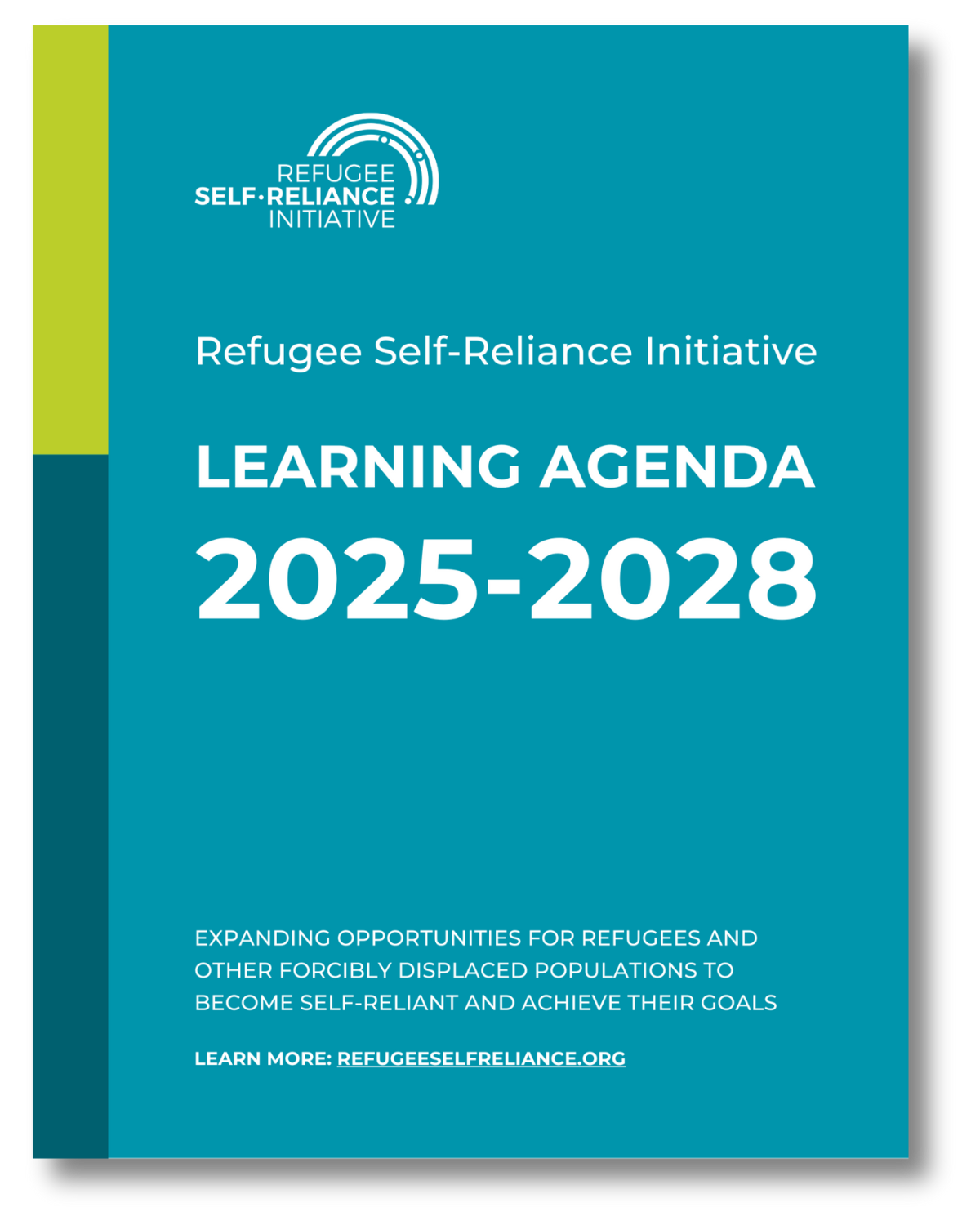2025-2028 Learning Agenda
The RSRI Learning Agenda guides learning and research priorities for the wider sector to build an evidence base of effective practices that improve refugee self-reliance.
The RSRI recognizes that rigorous research and evidence are critical building blocks in efforts to promote refugee self-reliance. Evidence demonstrates what types of programs and policies work in a variety of real-world contexts to drive self-reliance and informs how increased (or decreased) self-reliance impacts other development agendas. Evidence on effective programs and policies can also be used to shape policy priorities and funding.
Developed by the RSRI team and informed by the RSRI network members, the RSRI Learning Agenda cultivates and guides interest in critical yet under-researched aspects of self-reliance and empowers the RSRI network to contribute collectively and collaboratively to the existing base of knowledge.
As a multi-stakeholder initiative and convener, the RSRI aims to consolidate self-reliance learning for dissemination and widespread and inclusive access and knowledge building.
2019 Learning Agenda
-
To create an evidence base for what works best to help refugees achieve self-reliance
To provide a knowledge mapping of self-reliance learning and research (and outstanding gaps)
To highlight the role of the RSRI’s members in answering the ‘core questions’ of refugee self-reliance
-
To highlight the role of the RSRI’s members in answering the ‘core questions’ of refugee self-reliance
-
A lack of a common understanding of self-reliance and how it complements and supports each of the three durable solutions
A dearth of evidence about what works to help refugees achieve self-reliance (both in terms of programming and enabling environments)
A lack of clarity on the costs and timelines associated with refugees achieving self-reliance
Insufficient evidence of how refugee self-reliance contributes to host community outcomes.
A lack of clear measurement approaches for capturing the impacts of self-reliance programs and progress at the global level
-
Identification of program models and ingredients that help foster refugee self-reliance to facilitate replication, adaptation, and scaling
Consolidated, easily-accessed mapping of existing knowledge and evidence around refugee self-reliance
Identification of knowledge/evidence gaps for refugee self-reliance that requires further study
-
What is self-reliance?
How is ‘self-reliance’ understood by various stakeholders?
What are the barriers to the achievement of self-reliance? Why is it not happening more broadly and consistently in humanitarian/refugee settings?
What works best to facilitate self-reliance?
What are the different program models that assist refugees to achieve self-reliance, and what works best for different profiles of refugees depending on age, gender, socio-economic profile, duration of displacement, education level, context, etc.? What does the achievement of self-reliance look like for special needs populations — female-headed households, persons with disabilities, etc.?
Are there core principles/considerations that should underpin self-reliance programming? If so, what are they? What external factors are important to understand when designing self-reliance programs (cultural, macro-economic, etc.)
What are the costs of facilitating self-reliance? What are the value propositions and time frames, and how do those compare to other response paradigms? How long (on average) does it take to achieve self-reliance (and is this sustained)?
What work at the community, systems, and government levels is necessary to create enabling environments for self-reliance
How can self-reliance programs benefit both refugee and hosting communities? How can we mitigate tensions to become self-reliant? How can refugee self-reliance contribute to local economic development and improved opportunities for host communities.
How should/could self-reliance be measured?
What indicators or approaches should we use to track progress on self-reliance at the household, local, national, and global levels?
-
How can self-reliance programming support each of the three durable solutions? What kind of programs help facilitate self-reliance, but also help prepare for possible repatriation?
How can refugee self-reliance be maximized in different settings — urban, peri-urban, rural, settlement, camp? What does self-reliance look like within an Area Based Approach?
What are the critical differences between opportunities in the formal versus informal economy for achieving self-reliance? What added value does the formal right to work provide? Fair remuneration and safe working conditions?
What are the incentives and disincentives to allow/assist refugees to achieve self-reliance? What are the incentives and disincentives for refugees to achieve self-reliance?
-
Learning should happen from a cross-section of locations with different population groups, types of economies and industries, poverty levels, and refugee rights frameworks (including some CRRF and non-CRRF countries)
Connect and engage with other entities carrying out similar/related research
Potential for self-reliance learning agenda to fit into GRF pledges
Self-reliance learning is a long-term commitment to confirm sustainability



